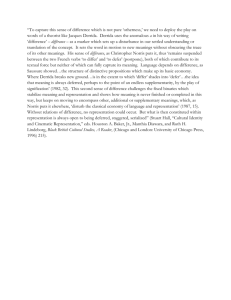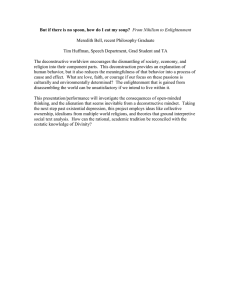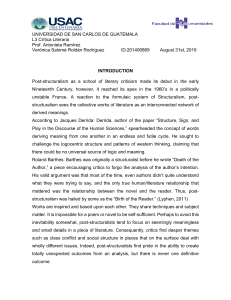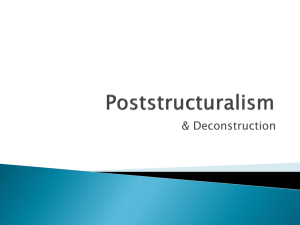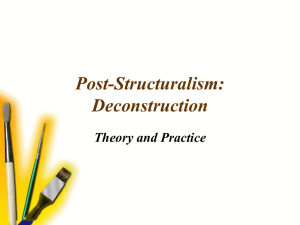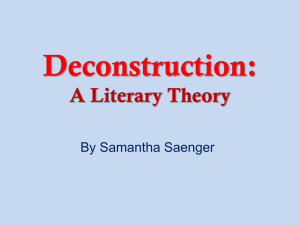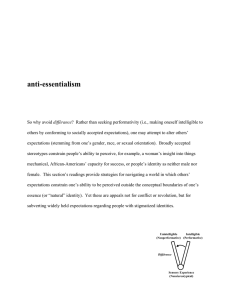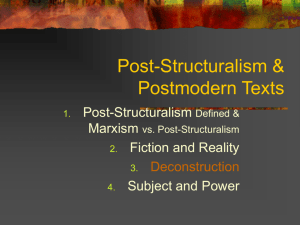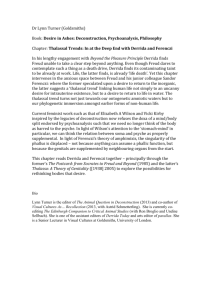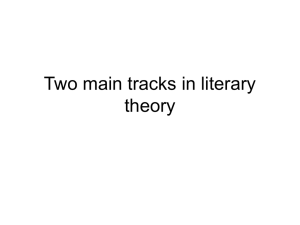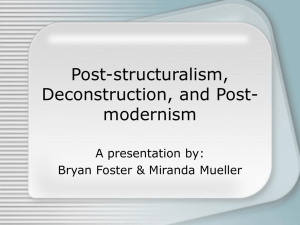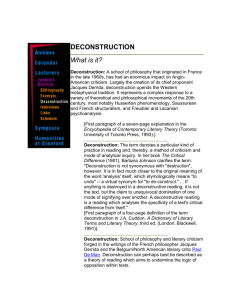1 Prof. Dr. Susanne Rohr / Prof. Dr. Ute Berns winter term 2011/12
advertisement
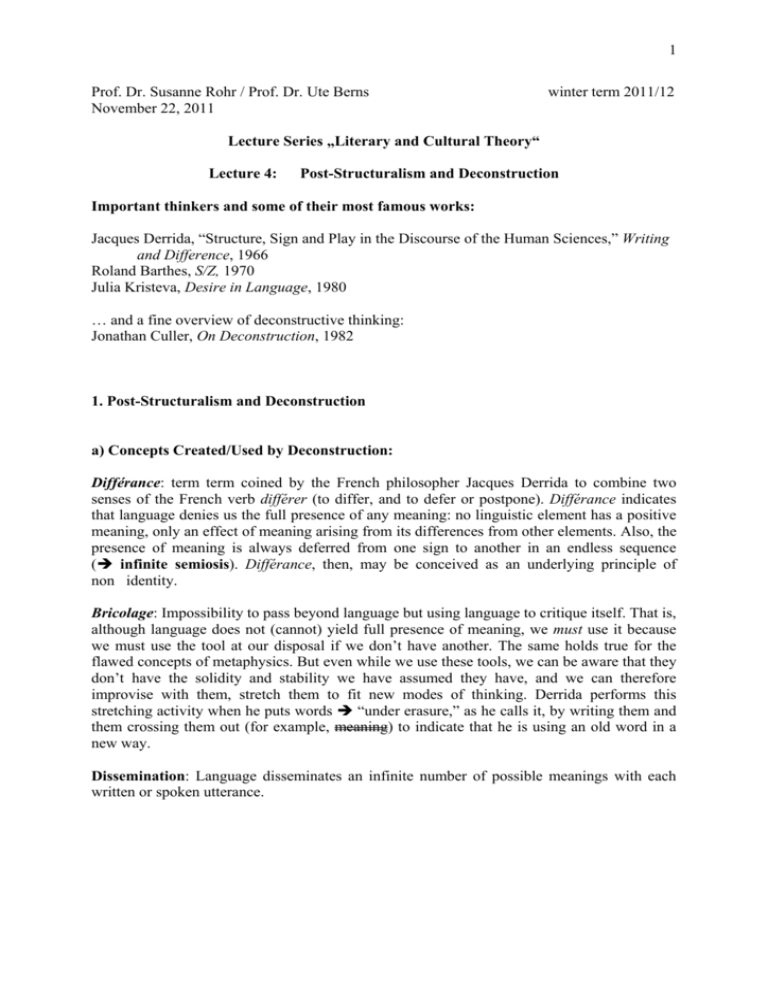
1 Prof. Dr. Susanne Rohr / Prof. Dr. Ute Berns November 22, 2011 winter term 2011/12 Lecture Series „Literary and Cultural Theory“ Lecture 4: Post-Structuralism and Deconstruction Important thinkers and some of their most famous works: Jacques Derrida, “Structure, Sign and Play in the Discourse of the Human Sciences,” Writing and Difference, 1966 Roland Barthes, S/Z, 1970 Julia Kristeva, Desire in Language, 1980 … and a fine overview of deconstructive thinking: Jonathan Culler, On Deconstruction, 1982 1. Post-Structuralism and Deconstruction a) Concepts Created/Used by Deconstruction: Différance: term term coined by the French philosopher Jacques Derrida to combine two senses of the French verb différer (to differ, and to defer or postpone). Différance indicates that language denies us the full presence of any meaning: no linguistic element has a positive meaning, only an effect of meaning arising from its differences from other elements. Also, the presence of meaning is always deferred from one sign to another in an endless sequence (Î infinite semiosis). Différance, then, may be conceived as an underlying principle of non identity. Bricolage: Impossibility to pass beyond language but using language to critique itself. That is, although language does not (cannot) yield full presence of meaning, we must use it because we must use the tool at our disposal if we don’t have another. The same holds true for the flawed concepts of metaphysics. But even while we use these tools, we can be aware that they don’t have the solidity and stability we have assumed they have, and we can therefore improvise with them, stretch them to fit new modes of thinking. Derrida performs this stretching activity when he puts words Î “under erasure,” as he calls it, by writing them and them crossing them out (for example, meaning) to indicate that he is using an old word in a new way. Dissemination: Language disseminates an infinite number of possible meanings with each written or spoken utterance. 2 b) Concepts of Western Thinking Criticized/Deconstructed by Post-Structuralism: Phonocentrism = Western thinking’s preference of the voice over the written text Logocentrism = the tradition of Western thinking that situates the logos, the word, as epistemologically superior in a system, and the idea that the center remains outside of the structure it organizes. Transcendental signifier = the sign which gives meaning to all other signs Transcendental signified = the sign to which all signs seem to point Teleology = thinking of life, language and history in terms of its orientation to a telos or goal Metaphysical thinking = thought-systems which depend on a first principle upon which a whole hierarchy of meanings may be constructed Some questions deconstructive critics ask about literary texts: 1. How do we bring into dialogue the various conflicting interpretations a text produces (the “play of meanings”) or the various ways in which the text doesn’t answer the questions it seems to answer, with the instability of language and the dissemination of meaning? 2. What ideology does the text seem to promote – what is its main theme – and how does conflicting evidence in the text show the limitations of that ideology? (We can usually discover a text’s overt ideological project by finding the binary opposition(s) that structure the text’s main theme(s).) 3 2. A Deconstructive Reading of Robert Frost’s “Mending Wall” (1914): 1 2 3 4 5 6 7 8 9 10 11 12 13 14 15 16 17 18 19 20 21 22 23 24 25 26 27 28 29 30 31 32 33 34 35 36 37 38 39 40 41 42 43 44 45 46 Something there is that doesn't love a wall, That sends the frozen-ground-swell under it, And spills the upper *boulders in the sun, And makes gaps even two can pass *abreast. The work of hunters is another thing: I have come after them and made repair Where they have left not one stone on a stone, But they would have the rabbit out of hiding, To please the yelping dogs. The gaps I mean, No one has seen them made or heard them made, But at spring mending-time we find them there. I let my neighbor know beyond the hill; And on a day we meet to walk the line And set the wall between us once again. We keep the wall between us as we go. To each the boulders that have fallen to each. And some are *loaves and some so nearly balls We have to use a spell to make them balance: “Stay where you are until our backs are turned!” We wear our fingers rough with handling them. Oh, just another kind of outdoor game, One on a side. It comes to little more: There where it is we do not need the wall: He is all *pine and I am apple orchard. My apple trees will never get across And eat the cones under his pines, I tell him. He only says, “Good fences make good neighbors.” Spring is the *mischief in me, and I wonder If I could put a notion in his head: “Why do they make good neighbors? Isn't it Where there are cows? But here there are no cows. Before I built a wall I'd ask to know What I was walling in or walling out, And to whom I was like to give *offense. Something there is that doesn't love a wall, That wants it down.” I could say “Elves” to him, But it's not elves exactly, and I'd rather He said it for himself. I see him there Bringing a stone grasped firmly by the top In each hand, like an old-stone savage armed. He moves in darkness as it seems to me, Not of woods only and the shade of trees. He will not go behind his father's saying, And he likes having thought of it so well He says again, “Good fences make good neighbors.” *Felsbrocken *nebeneinander *Klumpen *Föhre, Kiefer *Übermut *jmd. kränken 4
